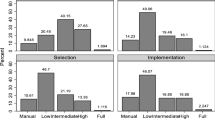Abstract
Research on procedural justice has provided ample evidence that people are concerned not only with the outcome of disputes but also with the fairness of the procedures used to resolve disputes. The majority of the studies examining the importance of procedural justice have been conducted in the United States and Western European countries. This study tests the generality of the procedural justice model by examining the importance of fair procedures to people in a non-Western country, Japan. This study also examines the meaning of a fair procedure from a legal perspective. Past studies have drawn the procedural justice criteria considered from social psychology. We examine several additional criteria derived from the legal concept of due process of law. Results indicate that fair procedures are more important to subjects than fair outcomes in both a traffic accident dispute and a breach of contract case. Furthermore, across both types of disputes, fairness concerns are more important than nonfairness concerns. These results are consistent with findings from studies conducted in Western countries. A new finding that emerges from the study is that the clarity with which a procedure is formulated and presented is a strong determinant of procedural justice judgments.
Similar content being viewed by others
References
Adler, J. W., Hensler, D. R., and Nelson, C. E. (1983). Simple Justice: How Litigants Fare in the Pittsburgh Court Arbitration Program, Rand, Santa Monica, CA.
Delgado, R., Dunn, C, Brown, P., Lee, H., and Hubbert, D. (1985). Fairness and formality: Minimizing the risk of prejudice in alternative dispute resolution.Wisconsin Law Rev. 1985: 1359–1404.
Haley, J. (1978). The myth of the reluctant litigant.J. Japan. Stud. 4: 359.
Hofstede, G. (1980).Culture's Consequence: International Differences in Work-Related Values, Sage, Beverly Hills, CA.
Hofstede, G. (1983). Dimensions of national cultures in fifty countries and three regions. In Deregowaki, J. B., Dziurawiec, S., and Annis, R. C. (eds.),Expiscations in Cross-Cultural Psychology, Swets and Zeitlinger, Lisse, the Netherlands, pp. 335–355.
Houlden, P., LaTour, S., Walker, L., and Thibaut, J. (1978). Preferences for modes of dispute resolution as a function of process and decision control.J. Exp. Soc. Psychol. 14: 13–30.
Kawashima, T. (1963). Dispute resolution in contemporary Japan. In von Mehren, A. T. (ed.),Law in Japan: The Order of a Changing Society, Harvard University Press, Cambridge, MA.
Kidder, R. L., and Hostetler, J. A. (1990). Managing ideologies: Harmony as ideology in Amish and Japanese Societies.Law Soc. Rev. 24: 895–922.
La Tour, S., Houlden, P., Walker, L., and Thibaut, J. (1976). Procedure: Some determinants of preference for modes of conflict resolution.J. Conflict Resolution 20: 319–355.
Leung, K. (1987). Some determinants of reaction to procedural models for conflict resolution: A cross-national study.J. Pers. Soc. Psychol. 53: 898–908.
Leung, K. (1988). Some determinants of conflict avoidance.J. Cross-Cultural Psychol. 19: 125–136.
Leung, K., and Lind, E. A. (1986). Procedural justice and culture: Effects of culture, gender, and investigator status on procedural preferences.J. Pers. Soc. Psychol. 50: 1134–1140.
Leventhal, G. S. (1980). What should be done with equity theory? New approaches to the study of fairness in social relationships. In Gergen, K., Greenberg, M., and Willis, R. (eds.),Social Exchange: Advances in Theory and Research, Plenum Press, New York, pp. 27–55.
Lind, E. A., and Earley, P. C. (1993). Procedural justice and culture.Int. J. Psychol. 27: 227–242.
Lind, E. A., Erickson, B. E., Friedland, N., and Dickenberger, M. (1978). Reactions to procedural models for adjudicative conflict resolution.J. Conflict Resolution 22: 318–341.
Lind, E. A., Lissak, R. I., and Conlon, D. E. (1983). Decision control and process control effects on procedural fairness judgments.J. Appl. Soc. Psychol. 13: 338–350.
Lind, E. A., MacCoun, R. J., Ebener, P. A., Felstiner, W. F., Hensler, D. R., Resnik, J., and Tyler, T. R. (1989). The perception of justice: Tort litigants' views of trial, court-annexed arbitration, and judicial settlement conferences, Rand, Santa Monica, CA.
Lind, E. A., and Tyler, T. R. (1988).Social Psychology of Procedural Justice, Plenum Press, New York.
Merry, S. E., and Silbey, S. S. (1984). What do plaintiffs want? Reexamining the concept of dispute.Justice Syst. J. 9: 151–178.
Resnik, J. (1987). Due process: A public dimension.U. Florida Law Rev. 39: 405–431.
Tanase, T. (1990). The management of dispute: Automobile accident compensation in Japan.Law Soc. Rev. 24: 651–691.
Takenishi, M., and Takenishi, A. (1990). Why Japanese citizens evaluate the new indirect tax as unfair: Fairness criteria and their relative importance.Soc. Justice Res. 4: 251–263.
Thibaut, J., and Walker, L. (1975).Procedural Justice: A Psychological Analysis, Erlbaum, Hillsdale, NJ.
Thibaut, J., and Walker, L. (1978). A theory of procedure.Calif. Law Rev. 66: 541–566.
Triandis, H. C. (1989). The self and social behavior in differing cultural contexts.Psychol. Rev. 54: 323–338.
Trubek, D. M. (1972). Max Weber on law and the rise of capitalism.Wis. Law Rev. 1972: 720–753.
Tyler, T. R., and Lind, E. A. (1992). A relational model of authority in groups. In M. Zanna (ed.),Advances in Experimental Social Psychology, Vol. 25, Academic Press, New York, pp. 115–192.
Author information
Authors and Affiliations
Rights and permissions
About this article
Cite this article
Sugawara, I., Huo, Y.J. Disputes in Japan: A cross-cultural test of the procedural justice model. Soc Just Res 7, 129–144 (1994). https://doi.org/10.1007/BF02337295
Issue Date:
DOI: https://doi.org/10.1007/BF02337295



